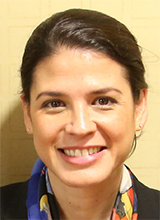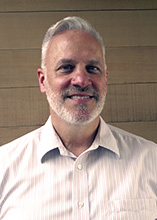
Scholarly Expertise: Psychiatric problems


Lucy Wang
Personal Statement
As a geriatric psychiatrist, my professional interests revolve around improving the quality of lives for people with dementia, dementia-related psychiatric symptoms, and their caregivers. I provide direct clinical care as a psychiatrist at the VA Puget Sound, and I am involved in projects addressing dementia-related agitation. As the UW geriatric psychiatry fellowship director, I also recognize that training the next generation of geriatric psychiatrists is vital in order to meet the growing population needs in geriatrics.
Amelia Dubovsky
Personal Statement
I am a Clinical Assistant Professor in the Department of Psychiatry and Behavioral Sciences at the University of Washington. I received my MD from New York University and completed my adult residency at the Harvard Massachusetts General Hospital/McLean Hospital program where I was chief resident. I then went on to complete a fellowship in psychosomatic medicine at the University of Washington. I am currently on faculty at Harborview Medical Center on the inpatient psychiatry consult service. I have a longstanding interest in the intersection between medicine and psychiatry, and am the author of numerous published articles on topics ranging from the neuropsychiatric effects of steroids to managing borderline personality disorder in the primary care setting. I have a particular interest in the use of electroconvulsive therapy, including in the treatment of catatonia. I am currently involved in research projects in conjunction with the division of nephrology and the neurosurgery department. In addition to my clinical and research interests, I am also an associate program director for the UW Adult Psychiatry Residency at Harborview Medical Center.
Carol Rockhill
Personal Statement
I am a child and adolescent psychiatrist with experience in delivering guideline-based care for child and adolescent psychiatric disorders. I am the Medical Director of the Outpatient Psychiatry Clinics at Seattle Children’s, and have experience with training of staff to deliver guideline-based care. I also have health services training, including having obtained a Master of Public Health (MPH) in Health Services and participation in a Primary Care-Psychiatry Research Fellowship funded by the National Institutes of Health.
My clinical work includes treatment of outpatients and inpatients with a variety of mental health needs, and I provide telepsychiatry in our outpatient clinics. I have experience with collaboration with primary care providers to deliver care to pediatric patients, including serving as a consulting psychiatrist on the Partnership Access Line, which provides psychiatric consultation regarding mental health assessment and treatment to pediatricians and other primary care physicians throughout the state of Washington. I have expertise in the treatment of common mental health problems in a pediatric population.
My research has focused on mental health care for common psychiatric illnesses including depression and ADHD, and has included utilization of collaborative models of care and testing of interventions for youth with psychiatric diagnoses. I have been a co-investigator, with R01 PI Kathleen Myers, MD, for a study of guideline-based care provided by telepsychiatry for youth in rural communities with a diagnosis of Attention Deficit Hyperactivity Disorder.

Doyanne Darnell
Personal Statement
My research aims to improve the public health impact of evidence-based behavioral health interventions for addressing comorbidities common among ethnoculturally diverse and underserved victims of trauma, including PTSD, depression, suicidal ideation, and risky substance use. I study the integration of behavioral interventions into general medical settings, with an emphasis on provider-centered training methods to support the delivery of patient-centered interventions. My current interest is in harnessing technologic innovations in machine learning and artificial intelligence, along with user-centered design, to enhance suicide prevention training scalability and sustainability. https://darnell.psychiatry.uw.edu/

Emily H Trittschuh
Personal Statement
As a clinical neuropsychologist who has specialized in aging, I have over 20 years of experience in the field of geriatrics. My clinical work and research has been focused on the full continuum of cognitive aging – from neurodegenerative disease of varied etiologies to healthy brain aging into the 90s and beyond. I have been based at the VA Puget Health Care System since 2008. In this time, I have developed additional and complementary interests in the older adult Veteran who has PTSD, especially how this disorder can interfere with cognition and might contribute to decline and also in the area of reducing disparities in neuropsychological care for individuals who are transgender and gender diverse. Currently, I am the Associate Director for Education and Evaluation for the VISN 20 Geriatric Research Education and Clinical Center (GRECC) at VA Puget Sound. I am a Professor in the Department of Psychiatry. Provision of training for future geriatric care providers (MD, PhD, RN, SW, etc) is an important part of my personal mission. I also enjoy connecting with the older adult community through various events and at local senior centers.
Greg Reger
I am a Professor in the Department of Psychiatry and Behavioral Sciences and I work as the Deputy Associate Chief of Staff for Mental Health at the VA Puget Sound Health Care System. I am a licensed clinical psychologist. My research is focused on studying mental health technologies to support Veterans, Service Members, their families, and the health care staff that treat them. I research mobile applications, virtual reality, virtual standardized patients, and other innovative approaches to improve mental health education and services. I have conducted DoD and VA funded research and focus on applied interventions that may have promise to make a difference in the lives of those we serve. I am an Army Veteran and current behavioral health officer in the Washington State Army National Guard.

Patrick Raue
Personal Statement
I am Professor and Associate Director for Evidence-Based Psychosocial Interventions at the AIMS Center, and Director of the National Network of PST Clinicians, Trainers & Researchers. In these roles, I develop and lead implementation and training programs in a variety of behavioral health interventions.

Stephen Thielke
Personal Statement
I am a geriatric psychiatrist and health services researcher. My research focuses on ways of improving mental health and well-being among older adults, especially those with dementia and their caregivers.

Garth Terry
Personal Statement
My research interests cover two main areas:
1) development and use of novel radioligands for positron emission tomography (PET) in CNS disorders
2) cannabinoid pharmacology, and cannabis use disorder and comorbid neuropsychiatric disorders
My VA Career Development Award (VA equivalent of an NIH K-award) focuses on the translational development of imaging neuroinflammation with PET following repetitive blast mild traumatic brain injury (mTBI). In collaboration with David Cook’s lab, imaging neuroinflammation in a mouse model of repetitive mTBI provides an opportunity to compare imaging outcomes directly with histopathology in brain tissue, which is not possible in humans. In collaboration with Elaine Peskind, imaging neuroinflammation in Veterans with mTBI and persistent post-concussive symptoms provides neuroanatomical specificity to ongoing neuroinflammation, which to date has been informed using cerebrospinal fluid and serum biomarkers. To accomplish this, my laboratory evaluates and develops established and novel PET radioligands for biomarkers of neuroinflammation. Additionally, I am interested in developing novel radioligands for druggable targets for which there are no current, suitable radioligands available. I have several ongoing collaborations with other investigators at UW and VA in which I provide support with PET imaging.
As a clinician and researcher, I am interested in how patients use cannabis for perceived therapeutic effect, and the risks and adverse outcomes resulting from substantial or chronic cannabis use. These clinical patterns can now be placed into context with a better understanding of the endocannabinoid system (ECS), which provide opportunity for more selective and safer therapeutic drug development. Due in part to the recentness of discovery of the ECS, one of my goals is to educate clinical providers on the preclinical and evidenced based research conducted to date on cannabis use and the ECS so they are better informed when discussing cannabis use with patients, and better prepared for understanding mechanisms of anticipated ECS-based medications currently under development. A second goal is to conduct research on cannabis use disorder and comorbid conditions, and identification of therapies that might better address a patient’s desired outcome from cannabis use, thereby reducing the likelihood of its associated risks.
